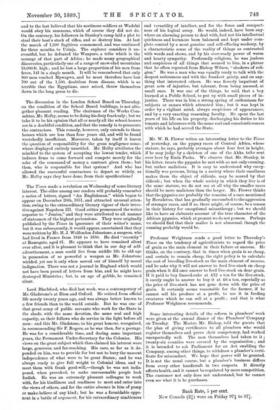Lord Blachford, who died last week, was a contemporary of
Mr. Gladstone's at Eton and Oxford. He retired from official life nearly twenty years ago, and was always better known to a few friends than to the world outside. But he was one of that great army of public servants who work for the State in the shade, with the same devotion, the same zeal and high capacity, as their fellows who do service in the light before all men : and this Mr. Gladstone, to his great honour, recognised, in recommending Sir F. Rogers, as he was then, for a peerage. He was for a considerable time, and during some important years, the Permanent Under-Secretary for the Colonies. His views on the great subject which thus claimed his interest were large, generous, and far-reaching. His care, so far as it de- pended on him, was to provide for but not to bury the nascent independence of what were to be great States; and he was always ready to give full weight to Colonial ideas, and to meet them with frank good-will,—though he was not indis- posed, when provoked, to make unreasonable people look foolish. He was an extremely pleasant colleague to work with, for his kindliness and readiness to meet and enter into the views of others, and for the entire absence in him of pomp or make-believe of any kind ; but he was a formidable oppo- nent in a battle of argument, for his extraordinary nimbleness
and versatility of intellect, and for the force and compact- ness of his logical array. He would, indeed, have been any- where an alarming person to deal with, had not his intellectual quickness and keenness been balanced and kept under com- plete control by a most genuine and self-effacing modesty, by a characteristic sense of the reality of things as contrasted with words and shows, and by his ever-ready power of warm and hearty sympathy. Profoundly religions, he was jealous and suspicions of all things that seemed to him, in a phrase that he often repeated from Bishop Wilson, "shadows of reli- gion." He was a man who was equally ready to talk with the deepest seriousness and with the frankest gaiety, and on any- thing that interested others. He was fiercely impatient of great acts of injustice, but tolerant, from being amused, at small ones. It was one of the things, he said, that a boy learned at a Public School, to put up with small pieces of in- justice. There was in him a strong spring of enthusiasm for subjects or causes which attracted him ; but it was kept in order by a vigilant mind, always suspicious of appearances, and by a very exacting reasoning faculty. He spent the last years of his life on his property, discharging his duties to his tenants and labourers with the same zeal and conscientiousness with which he had served the State.






































 Previous page
Previous page